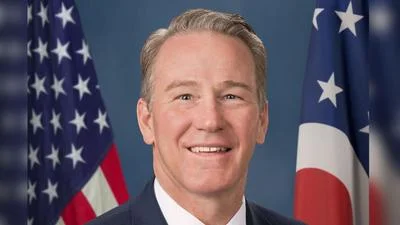J.D. Vance Official | Official U.S. Senate headshot
J.D. Vance Official | Official U.S. Senate headshot
“I think there’s a fundamental issue here that Europe really has to wake up to … You don’t win wars with GDP or euros or dollars. You win wars with weapons, and the West doesn’t make enough weapons.”
Senator Vance on President Trump’s success in deterring Russia, the limited ability of the West to produce weapons, and the United States’ need to pivot its focus to East Asia:
“We have to remember that despite a lot of the hand-wringing, and I’ve heard a lot of it in private meetings and public meetings, Donald Trump was maybe the best president at deterring Russia in a generation.
“In fact, the only time that Russia has not invaded a foreign country over the last 20 years was the four years that Donald Trump was President. And it’s interesting that so many people accuse Trump, or me, or others of being in Putin’s pocket, and yet the person that Vladimir Putin says he wants to be the next president is not Donald Trump – he says Joe Biden is his preferred candidate because he’s more predictable.
“Now, on the question of European security, I think there’s a fundamental issue here that Europe really has to wake up to. And I offer this in the spirit of friendship, not in the spirit of criticism, because, no, I don’t think that we should pull out of NATO, and no, I don’t think that we should abandon Europe. But yes, I think that we should pivot. The United States has to focus more on East Asia. That is going to be the future of American foreign policy for the next 40 years, and Europe has to wake up to that fact.
“Now, let me just throw a couple of facts out there. Number one, the problem in Ukraine from the perspective of the United States of America, and I represent, I believe, the majority of American public opinion, even though I don’t represent the majority of opinion of senators who come to Munich, is that there’s no clear endpoint, and fundamentally the limiting factors for American support of Ukraine, it’s not money, it’s munitions. America, and this is true, by the way, of Europe too, we don’t make enough munitions to support a war in Eastern Europe, a war in the Middle East, and potentially a contingency in East Asia. So the United States is fundamentally limited.
“Now, let me just throw very specific details. The PAC-3, which is a Patriot interceptor, Ukraine uses in a month what the United States makes in a year. The Patriot missile system is on a five year back order, 155 millimeter artillery shells on more than a five year back order, We’re talking in the United States about ramping up our production of artillery to 100,000 a month by the end of 2025. The Russians make close to 500,000 a month right now at this very minute. So the problem here vis-à-vis Ukraine is America doesn’t make enough weapons, Europe doesn’t make enough weapons, and that reality is far more important than American political will or how much money we print and then send to Europe. And the final point that I’ll make just to respond here, because I know people have heard what Trump said, and you know, they’ve criticized it and they’ve said, well, ‘Trump is going to abandon Europe.’
“I don’t think that’s true at all. I think Trump is actually issuing a wake up call to say that Europe has to take a bigger role in its own security. Germany just this year will spend more than 2% of GDP. That, of course, is something that we had to really push for in the United States, and it just now has finally cleared that threshold.
“But it’s not just about money spent. How many mechanized brigades could Germany field tomorrow? Maybe one. The problem with Europe is that it doesn’t provide enough of a deterrence on its own because it hasn’t taken the initiative in its own security. I think that the American security blanket has allowed European security to atrophy.
“And again, the point is not we want to abandon Europe. The point is we need to focus as a country on East Asia, and we need our European allies to step up in Europe. I appreciate what my English friend [David Lammy] over here said. And of course, England has been one of the few exceptions where I think it has fielded a very capable military over the last generation. But that hasn’t been true for a lot of Europe, and that has to change.”
Senator Vance on the need for a negotiated peace to end the war in Ukraine:
“It’s very hard, the juxtaposition between the idea that Putin poses an existential threat to Europe, compared again against the fact that we’re trying to convince our allies to spend 2% of GDP. Those ideas are very much in tension. I do not think that Vladimir Putin is an existential threat to Europe and to the extent that he is, again, that suggests that Europe has to take a more aggressive role in its own security.
“That’s number one. But again, I go back to this question about ‘abandoning Ukraine.’ If the package that’s running through the Congress right now, $61 billion of supplemental aid to Ukraine, goes through, I have to be honest to you, that is not going to fundamentally change the reality on the battlefield. The amount of munitions that we can send to Ukraine right now is very limited.
“Again, not by American willpower or by American money, but by American manufacturing capacity. All of those back orders that I just highlighted, those are not problems in the future. Those are problems today, and they provide real limitations. So all I’m saying is in that world of real limitations, what is realistic to accomplish in Ukraine? Can we send the level of weaponry we’ve set for the last 18 months for the next 18 months?
“We simply cannot. No matter how many checks the US Congress writes, we are limited there. Munitions matter a lot in warfare. What we haven’t talked about, of course, is manpower matters a lot in warfare, and we know the Ukrainians are very limited on that. So our argument, at least my argument here is, given the realities that we face, the very real constraints in munitions and manpower, what is reasonable to accomplish and when do we actually think we’re going to accomplish it?
“And my argument is, look, I think what’s reasonable to accomplish is some negotiated peace. I think Russia has incentive to come to the table right now. I think Ukraine, Europe, and the United States have incentive to come to the table. That is going to happen. This will end in a negotiated peace. The question is when it ends in a negotiated peace and what that looks like.
Senator Vance on prioritizing American interests when engaging with adversaries:
“To respond to Navalny’s death: look, he was clearly a brave person. His death is a tragedy. I don’t think that he should have been in prison. I don’t think that he should have been killed in prison. And I condemn Putin for doing it. But here’s the problem: it doesn’t teach us anything new about Putin.
“I’ve never once argued that Putin is a kind and friendly person. I’ve argued that he’s a person with distinct interests, and the United States has to respond to that person with distinct interests. We don’t have to agree with him. We can contest him and we often will contest him. But the fact that he’s a bad guy does not mean we can’t engage in basic diplomacy and prioritizing America’s interests. There are a lot of bad guys all over the world, and I’m much more interested in some of the problems in East Asia right now than I am in Europe.
Senator Vance on the state of weapons manufacturing in the West, the risk posed by deindustrialization, and the inability of measures like GDP to indicate a nation’s military strength:
“We need Europe to play a bigger share of the security role, and that’s not because we don’t care about Europe … it’s because we have to recognize that we live in a world of scarcity. When I listen to these questions and I listen to so many of the private conversations I’ve had, one of the attitudes that I think is very, very dominant at the Munich Security Conference is the idea of the American superpower that can do everything all at once.
“And what I’m telling you is that we live in a world of scarcity, a world of scarcity and weapons manufacturing and America’s capacity to make the critical machinery of war, and that world of scarcity is what I’m trying to get us all to wake up to. In that world of scarcity, we can’t support Ukraine and the Middle East and contingencies in East Asia. It just doesn’t make any sense. The math doesn’t work out in terms of weapons manufacturing.
“One final point I want to make here is I hear a lot of self-congratulation in this room and some of the conversations that I’ve had back home in the United States, this is not just a criticism of Europe, a lot of self-congratulation about how much our GDP is bigger than Russia’s GDP.
“And yes, we are richer than Russia. Our citizens have better lives than the average Russian citizen. That is certainly something to celebrate and be proud of. But you don’t win wars with GDP or euros or dollars. You win wars with weapons, and the West doesn’t make enough weapons. I don’t mean to beat up on Germany here because I love Germany, but I want to respond to something [Member of the German Bundestag] Ms. Lang said earlier. Look, Germany is the one country, maybe in NATO, that did not follow the stupid Washington consensus and allow their country to be deindustrialized during the ‘70s, ’80s, and ‘90s. And yet, at the very moment that Putin is more and more powerful, where the Russian army is invading European countries en masse, this is the point at which Germany starts to deindustrialize?
“Look at the number of people working in manufacturing in Germany now versus ten years ago. Look at the critical raw materials produced in Germany now versus ten years ago. The energy dependence now versus 10 or 20 years ago. We have got to stop deindustrializing. We want Europe to be successful, but Europe has got to take a bigger role in its own security. You can’t do that without industry.”
To watch the full panel discussion, click here.
Original source can be found here.






 Alerts Sign-up
Alerts Sign-up